Anti-Semitism
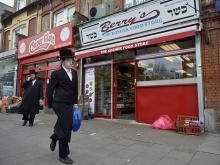
Swastikas found in a children’s playground in London are the latest sign of anti-Semitism on the rise in Europe.
The hand-drawn swastikas appeared on four consecutive days, June 14-17, in a park in the Stamford Hill neighborhood, The Guardian newspaper reported June 20. A home for British Jewish veterans is nearby.

A 94-year-old former SS guard at Auschwitz was convicted in a German court of complicity in the murder of 170,000 people at the Nazi death camp and sentenced to five years in jail, according to media reports.
The verdict in the case against Reinhold Hanning was announced June 17 by the judge presiding over what is likely Germany’s last Holocaust trials, Reuters reported. Hanning, who could have faced a 15-year sentence, will remain free pending any appeals.
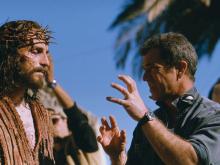
Mel Gibson is hoping for a hit with a sequel to his 2004 blockbuster The Passion of the Christ, this time with a film focusing on the resurrection.
Gibson will direct the movie based on a screenplay by Randall Wallace, Wallace confirmed to The Hollywood Reporter June 9.

While many countries in Europe have sealed their borders to refugees, Germany has done the opposite. Last year, the country registered over 1 million asylum seekers, including 425,000 from ravaged Syria.
No other country in the European Union has accepted as many. For Syrians and others who risk their lives crossing the Mediterranean Sea in rubber dinghies, Germany has become a beacon of hope.

At Holocaust Remembrance Day at the Capitol, speakers warned of anti-Semitism as a problem of the millennia, and hate speech as a challenge that threatens present-day America.
Eight elderly survivors of the Holocaust — which took the lives of 6 million Jews, including 1.5 million Jewish children — lit six candles at the Capitol’s Emancipation Hall on May 5 as a United States Holocaust Memorial Museum official told of the death camps they survived, and of those who had risked their lives to save them.

“Contaminated by the monstrous and rooted ‘certitude’ that in this catastrophic and absurd world there exists a people chosen by God … the Jews endlessly scratch their own wound to keep it bleeding, to make it incurable, and they show it to the world as if it were a banner,” read Daniel Jonah Goldhagen, at a Georgetown University conference Feb. 29 on anti-Semitism in Europe.
“Now, if I told you that these were the words of a Hamas leader, or any number of Middle Eastern political officials, or movement leaders, you wouldn’t be very surprised,” he said.
“But these were the words of Jose Saramago, the Nobel Prize-winning author, as published in 2002 in El Pais, the paper of record of Spain.”
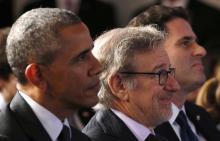
President Obama warned of growing anti-Semitism in the United States and the world as he honored two Americans and two Poles who helped save Jewish lives during World War II.
“Here, tonight, we must confront the reality that around the world, anti-Semitism is on the rise. We cannot deny it,” Obama said at a Holocaust remembrance ceremony at the Israeli embassy Jan. 27. He cited Jews fleeing European cities; attacks on Jewish centers in Mumbai, India and Overland Park, Kan.; and swastikas on college campuses.

Jan. 27 is International Holocaust Remembrance Day, the date the United Nations has chosen to commemorate victims of the Holocaust during World War II. Six million Jews were murdered by Germany’s Nazi regime, along with 5 million non-Jews who were killed. The anniversary, marked each year since 2005, falls on the anniversary of the liberation of the Auschwitz-Birkenau death camp in Poland by the Russian army in 1945. One million people died there.

As France marks the anniversary of the terrorist shootings that targeted a kosher supermarket and a satirical weekly, a new report warns anti-Semitism here continues to rise, taking a myriad of underreported forms.
“Violence targeting Jews and Jewish sites has led to a heightened sense of insecurity, and an increasing number of Jews are relocating in or outside France for security reasons,” U.S. advocacy group Human Rights First wrote in a report published Jan. 7.

My rabbinic colleague, David Saperstein, the U.S. ambassador-at-large for international religious freedom, issued a “glass half full” report earlier this month, noting that “… over the last several years there’s been a steady increase in the percentage of people who live in countries that … have serious restrictions on religious freedom.”
At the same time, he noted, “we’ve seen enormous expansion of interfaith efforts on almost every continent to try and address the challenges.”
Much of that “enormous expansion of interfaith efforts” can be traced to the historic Nostra Aetate (Latin for “In Our Time”) Declaration that the world’s Catholic bishops adopted 50 years ago at the conclusion of the Second Vatican Council.
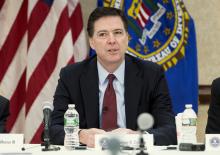
The director of the FBI stepped in it.
Or did he?
Last week, James B. Comey delivered a speech at the U.S. Holocaust Memorial Museum in which he said the murderers and accomplices of Germany, Poland, and Hungary “convinced themselves it was the right thing to do, the thing they had to do. That’s what people do. And that should truly frighten us.”
The Polish government was not happy. President Bronislaw Komorowski castigated Comey for his “ignorance, lack of historical knowledge, and possibly large personal aversion” toward Poles. And, as a gesture of goodwill, Comey has apologized.
Let’s be clear here. Comey was not accusing the nation of Poland of being complicit in the Holocaust. For all intents and purposes Poland as a nation temporarily ceased to exist during World War II.
But Poles, Hungarians, Germans, Lithuanians, Ukrainians, Croats, Estonians, Dutch, Latvians — who can deny that so many of them were willing conspirators with the Nazis in the roundup of Jews and the wholesale destruction of European Jewish life?
Here is how Komorowski could have responded:
“Poland suffered terribly during World War II. We were invaded by both the Soviet Union and Germany. The Nazis intended to turn our people into a permanent underclass of slaves. If you have read William Styron’s book Sophie’s Choice, or if you have seen the movie, then you know that the Nazis kidnapped Polish children and raised them as their own. Auschwitz was a killing field for the Poles, no less than for the Jews.
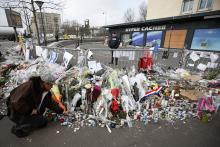
The number of violent anti-Semitic attacks around the world surged nearly 40 percent last year, according to a report released April 15 by researchers at Tel Aviv University in Israel.
The report found there were 766 recorded incidents against Jewish people in 2014 — the worst year for attacks since 2009. It was released ahead of Israel commemorating Holocaust Remembrance Day, which began April 15 at sundown.
The attacks were “perpetrated with or without weapons and by arson, vandalism, or direct threats against Jewish persons or institutions such as synagogues, community centers, schools, cemeteries, and monuments as well as private property,” the authors of the report, based at the Kantor Center at Tel Aviv University, said.
In 2013, there were 554 registered incidents.

Anti-Semitic incidents in the U.S. spiked 21 percent last year, according to the Anti-Defamation League, unsettling many American Jews who had thought that hatred of Jews and Judaism was on the decline, at least here at home.
The ADL has released a spring report for the past 10 years that showed fewer incidents targeting American Jews. That downward trend contrasted sharply to the rising tide of anti-Semitism in Europe — recently witnessed in the January killings of four Jews at a kosher supermarket in Paris.
“The United States still continues to be unique in history” as a safe place for Jews, said Abraham Foxman, the ADL’s national director.
But this new ADL report casts a shadow on the idea that the U.S., which is home to more than 40 percent of the world’s Jews, stands in stark contrast to European anti-Semitism and far higher levels of antipathy against Jews in the Middle East, as reflected in studies of anti-Semitic attitudes worldwide.
“It’s still different here than anywhere else, but don’t take anything for granted, and be concerned,” Foxman said.

This year, Good Friday and the start of Passover occur on the same date: Friday, April 3. The coincidence is no accident.
Jesus’ pilgrimage to Jerusalem to celebrate the eight-day Jewish festival marking the Hebrew slaves’ exodus from Egyptian slavery was a religious requirement for Jews of his day. After his death by Roman crucifixion, Passover became an integral part of the Easter story, and Jesus’ Last Supper was like an early version of what later became the Passover seder meal.
In past years, I anonymously attended Good Friday services in New York and sat alongside Christians as they commemorated the death of Jesus as recounted in the New Testament Gospel of John. I alternated each year between Roman Catholic and Protestant churches because I was interested in how preachers handled John’s 71 references to the Jewish people, a text that’s often called “radioactive” because of its negative teaching about Jews and their alleged culpability in killing Jesus.
I attend the most solemn Christian service of the year knowing it had often been a day of dread and even death for many European Jewish communities.
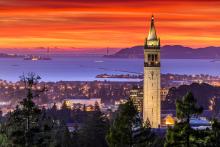
Is anti-Semitism rising on U.S. college campuses?
According to most statistics, yes — but the phenomenon is far more complicated than it first appears, primarily because everyone oversimplifies it.
The data, and the anecdotes, are shocking. In a study conducted in spring 2014 (notably, before the Israel/Gaza conflagrations of last summer), 54 percent of Jewish students said they had personally witnessed or experienced an anti-Semitic incident. And in just the last two months, swastikas have been painted on walls at the University of California’s Berkeley and Davis campuses and at New York’s John Jay College.
But what do these incidents mean? There is a great reluctance even to engage with the question.
Among liberals, even though it is obvious that many of these incidents are motivated in part by Israel/Palestine politics, no one wants to give hatred a pass. A swastika is a swastika, graffiti is graffiti, and collective guilt — in this case, blaming all Jews for specific actions of Israel — is always wrong.
Conservatives, meanwhile, routinely conflate anti-Israel and anti-Semitic speech. The far-right David Horowitz Freedom Center, for example, recently released its list of the American college campuses with the “worst anti-Semitic activity.” But many of those activities were protests of Israel. Extreme, perhaps, and unfair; but not really the same as anti-Semitism.
The fact is, the borders of anti-Semitism are permeable. Human speech does not divide neatly into “hate speech” and “political speech.” Thus, if we are to avoid the over-generalizations, we must be more rigorous in our definitions of the phenomenon or we risk diluting the evil of anti-Semitism itself.
In fact, a swastika is not just a swastika. Consider an anti-Israel protest that depicts an Israeli flag with a swastika on it. Offensive, to be sure. But what is it saying? It’s saying that Nazis are bad, and that the Israeli government is Nazi-like.
Now consider an anti-Semitic incident in which someone sprays a swastika on a synagogue door. Also grossly offensive, to say the least. But it is saying something very different. It is saying that Nazis are good, and we should finish the work they started.
The same symbol thus has two nearly opposite meanings.
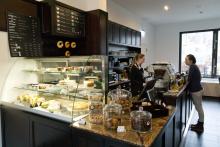
In Cafe Elfenbein, which opened last year in a trendy Berlin neighborhood, two businessmen wearing yarmulkes — Jewish skullcaps — chat away.
The aroma of freshly brewed coffee and homemade rugelach pastry fills the shop, where a rabbi has certified that all its food is kosher.
The hip addition to the city points to a trend obscured by rising anti-Semitism and terror attacks in France and Denmark that have alienated Jews. In central and Eastern Europe, Jewish life is thriving.
One major reason is that a young and more confident generation is shaping a new Jewish identity.
“Jewish life is flourishing in Berlin and the rest of the country,” said Jutta Wagemann, spokeswoman for the Central Council of Jews in Germany.
The Jewish community in Germany remains small, about 200,000 out of 80 million people. It has grown significantly from its postwar population of 37,000 in 1950 because of immigration from the former Soviet Union. The community is putting its stamp these days on the country’s cultural landscape.
In the East German city of Cottbus, an area known for right-wing extremists, a disused church was recently turned into a synagogue, providing space for the 460 members of the Jewish-Russian community.
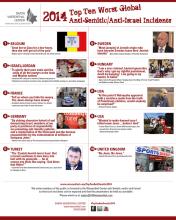
Hoping to draw more attention to the global problem of attacks against Jews and Judaism, the Simon Wiesenthal Center on December 29 released its list of the top 10 worst anti-Semitic and anti-Israel incidents of 2014.
The list can “bring focus to the fact that anti-Semitism has been increasingly manifest in the mainstream of society,” said Rabbi Abraham Cooper, associate dean of the center, which is named for the famed Holocaust survivor and Nazi hunter.
“Anti-Semitism is not just a Jewish problem, and it certainly is not going to get solved without awakening the non-Jewish world to deal with it.”
Founded in 1977 to combat anti-Semitism and bigotry in general, the Los Angeles-based center started drawing up the annual list in 2010 to highlight prejudice against Jews, but also criticism of Israel that seeks to delegitimize or demonize the Jewish state.
Below are the three worst incidents on this year’s list.

AS CHRISTIANS concerned about peace and justice, this time of crisis in the Middle East provides us an opportunity to return to our principles, the “springs of living waters” for people of faith:
- We need to oppose both anti-Semitism as well as any form of discrimination and racism against Palestinian Arabs. Solutions that promote or tolerate discriminatory and racist institutions and practices should be forthrightly condemned. Settlements, illegal under international law and discriminatory against Palestinians, need to be rejected rather than tolerated and legitimized.
- We need to work for justice, which requires that we work for a solution that levels the playing field rather than seek a “realistic” approach that reflects the balance of power between the parties, necessarily favoring the strong against the weak.
- We need to seek reconciliation and peace between the parties, rather than assuming eternal hostility and enmity between the parties.
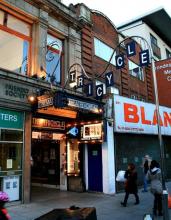
A London theater is refusing to host the UK Jewish Film Festival because it receives partial funding from the Israeli Embassy.
But the theater’s artistic director, Indhu Rubasingham, the English-born daughter of Sri Lankan parents, issued a statement Tuesday saying that because of the ongoing Israeli-Palestinian conflict, the theater’s board decided not to host the festival under its current sponsorship arrangement.
“The festival receives funding from the Israeli embassy and given the current conflict in Israel and Gaza, we feel it inappropriate to accept financial support from any government agency involved,” she said in a statement. “We offered to provide alternative funding to cover the loss of the contribution from the Israeli embassy. However, the UKJFF decided it was not willing to decline sponsorship from the Israeli embassy and, to our regret, withdrew the festival from The Tricycle.”

Italian officials on Tuesday moved to expel a Moroccan imam who was caught on video inciting violence against Jews during Israel’s military offensive in Gaza.
Interior Minister Angelino Alfano said he had ordered the imam, Raoudi Aldelbar, to be expelled “for seriously disturbing the peace, endangering national security, and religious discrimination.”
The imam was filmed during a Friday sermon in a mosque near Venice last month calling for Jews to be killed “one by one,” according to the Washington-based Middle East Media Research Institute, which published the video on its website.
“Oh Allah, count them one by one and kill them all,” the imam allegedly preached during the service at the mosque in the northern city of San Dona di Piave.
After the video was aired in Italy by the center-right daily, Libero, Alfano said: “Uttering anti-Semitic sermons that explicitly incite violence and sectarian hatred is unacceptable. May my decision in this case be a warning to all those who think you can preach hatred in Italy.”
The government’s decision drew widespread support across the political spectrum and from the Muslim community in the Veneto region, where the imam is based.